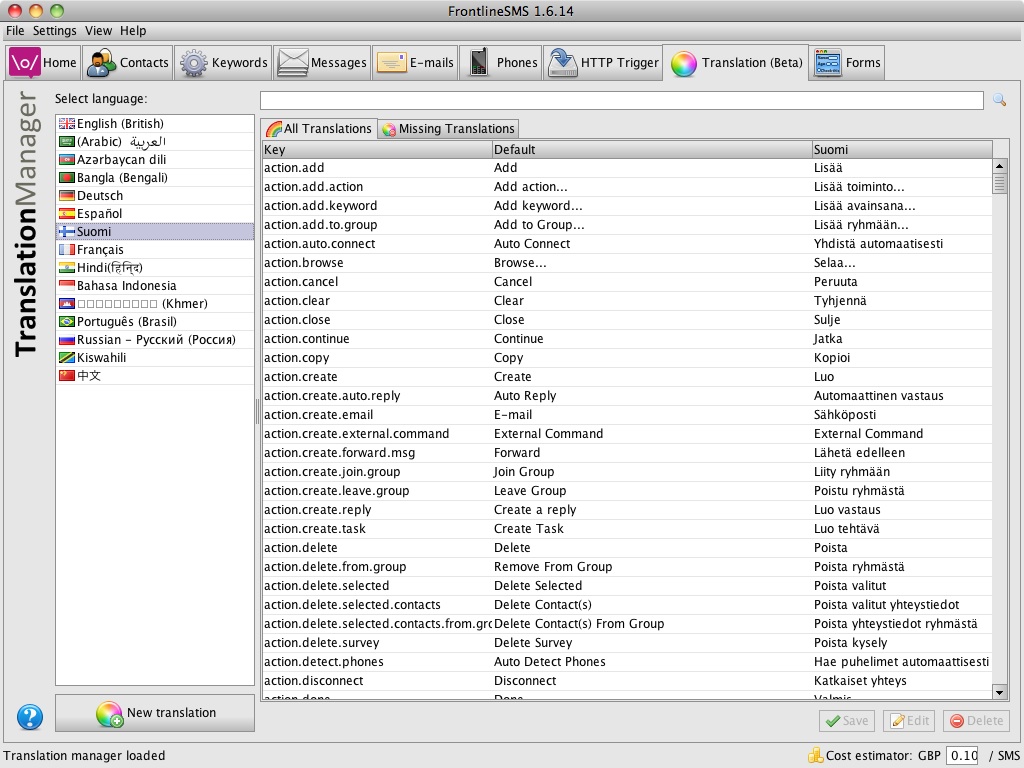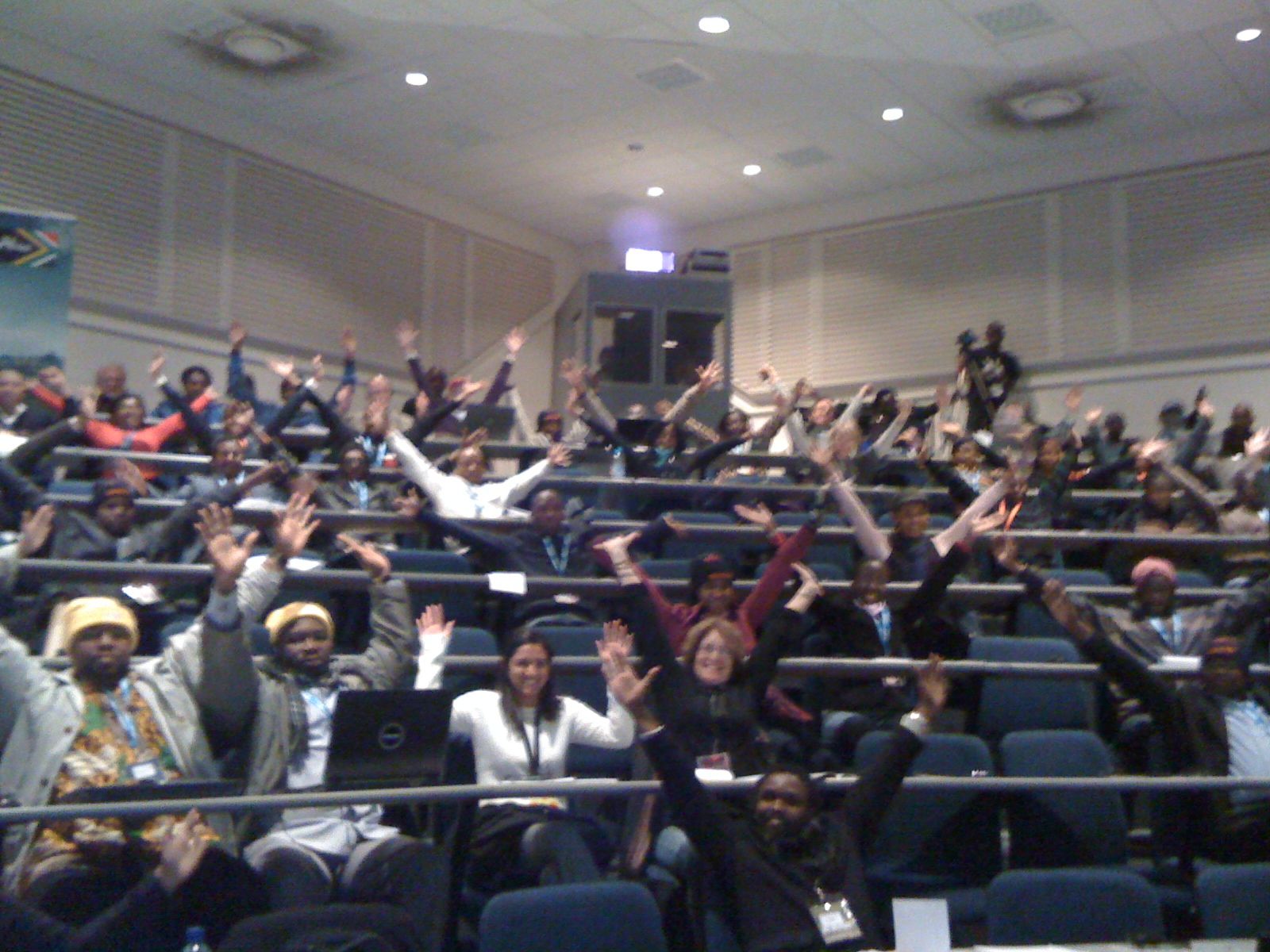As it turns out - most of human infrastructure is built on (arguably) secure, dumb pipes. It’s what enables us to rely on infrastructure without constantly worrying that it’s being used against us. Confidence in the security of dumb pipes is why we drink water from taps (or bottles), trust pharmacists, and express some of our most personal things to our loved ones, over the phone. In fact, one of the things that makes Signal such a growingly popular app is that its lack of commercial motivation means that it doesn’t have to make the revenue-driven turn to user exploitation. Signal can stay smart about being intelligently secure, dumb (wilfully ignorant, really) pipes.
The Big 1-O
How we made FrontlineSync
This year we deployed our Android SMS gateway app — FrontlineSync — to public beta. We decided to build FrontlineSync to make it easier for our users to connect the power of FrontlineSMS to the GSM network. Connecting to the mobile network can be a barrier to users, so we wanted to build a resilient and easy to use platform that would work everywhere.
News That is Node-Worthy: An Idea For Connecting Community Radio Stations in Indonesia
Worldwide, media outlets are increasingly mastering two-way communications channels. Radio and television stations are equipped to receive text messages, phone calls, and social media inputs. Staff can then decide to respond over broadcast, or back through the incoming channel. Yet these communications are often restricted to a single node; one community radio station, or a single television outlet, connecting to its own audience. There are often gaps in transmitting that information to other outlets who might also find that information relevant.
The View from 100,000
Here at FrontlineSMS, we’ve been making software for a long time. When we first released Version 2 of our software, a little over a year ago, we were one of a few SMS management platforms available- one of even fewer that was free and open source. At the time, we were proud to have around 25,000 downloads and an active user community. You can imagine our surprise when we checked our download numbers last week and learned that FrontlineSMS has been downloaded more than 100,000 times- more than 75,000 times in a little over a year. We were so excited, we got a cake. You have to understand, when things get serious at FrontlineSMS, we get serious about getting a cake.
7 Ways Newsrooms Can Boost Citizen Reporting
In my previous post, I argued that established, traditional newsrooms tend to be most comfortable accepting citizen reporting or user-generated content during a large-scale, widespread emergency event. In these circumstances, newsrooms often accept photo and video submissions from the public, or even seek them out on Instagram, Vine or Twitter. Professional journalists or editors may curate tweets or blog posts to summarize the experience of citizens. They may also make a public request for input from those affected, or to clarify incoming information.
Can Citizen Journalism Move Beyond Crisis Reporting in Traditional Newsrooms?
Citizen reporters broke much of the news, though they still needed broadcast media to help spread it. In some cases, citizens were able to capture iconic photos of events. Others were able to tell compelling stories about how the emergency affected their lives, including obeying the "stay in place" request by government officials during the manhunt. It has been widely reported how quickly social communities also got information wrong, including falsely accusing suspects. But I've seen a nearly equal number of reports showing how quickly these communities were able to self-correct their own misinformation.
Lowering barriers to adoption isn't just one approach - it's critical to real 'scale'
Our brand of ‘agile’
“Our dev team does SCRUM, with user-centric, test-driven development”. We’re proud of that statement, but also very aware of how unsubstantiated that claim can sound. We’ve all heard the stories of the tech companies with 6-month-long ‘iterations’ and 3000-page specification documents that nonetheless brand themselves Agile. These horror stories could push some to follow their agile approach of choice to the letter, for fear of being swept downstream into the dreaded waterfall, but at FrontlineSMS we feel we’ve adapted much of the industry’s best practices and most trusted tools to create a process that gives us confidence in our code, and the ability to create an ever-improving product for our users.
The Data Divide
Do you remember when grocery stores didn’t know you were pregnant before your parents? Or when newspapers couldn’t find naked pictures of you by looking through your phone? Boy, those were the days (When did I get this old?). Still, there’s no escaping it. Things are digitizing. Everywhere. Whether you’re registering to vote in Washington State using Facebook or banking on your mobile phone in Kenya, there are, all of a sudden, a bunch of third-party organizations involved in the most intimate parts of your life that weren’t there before. And, for the most part, that’s a good thing. Services are delivered more quickly, collective action is easier to organize, and you can do, well, almost everything, better.
News Participation Starts at 'Home'
Seemingly every major news event worldwide is heightening participation in news. People are eager to share updates and photos of an unfolding news event, ask questions of media outlets, and share important information. But there are two important aspects to this type of participation: (1) people are most interested in sharing news about the community around them, specifically with others in their community and (2) the mechanism by which they choose to share information is dependent upon personal habits and access. In other words, people write about their immediate world using their 'home' or go-to platform.
Social media and the rise of FrontlineSMS
It's Social Media Week this week, and in recognition of this and our seventh anniversary next month, we asked our Founder, Ken Banks, to reflect on the role that social media has played in the history and development of FrontlineSMS.
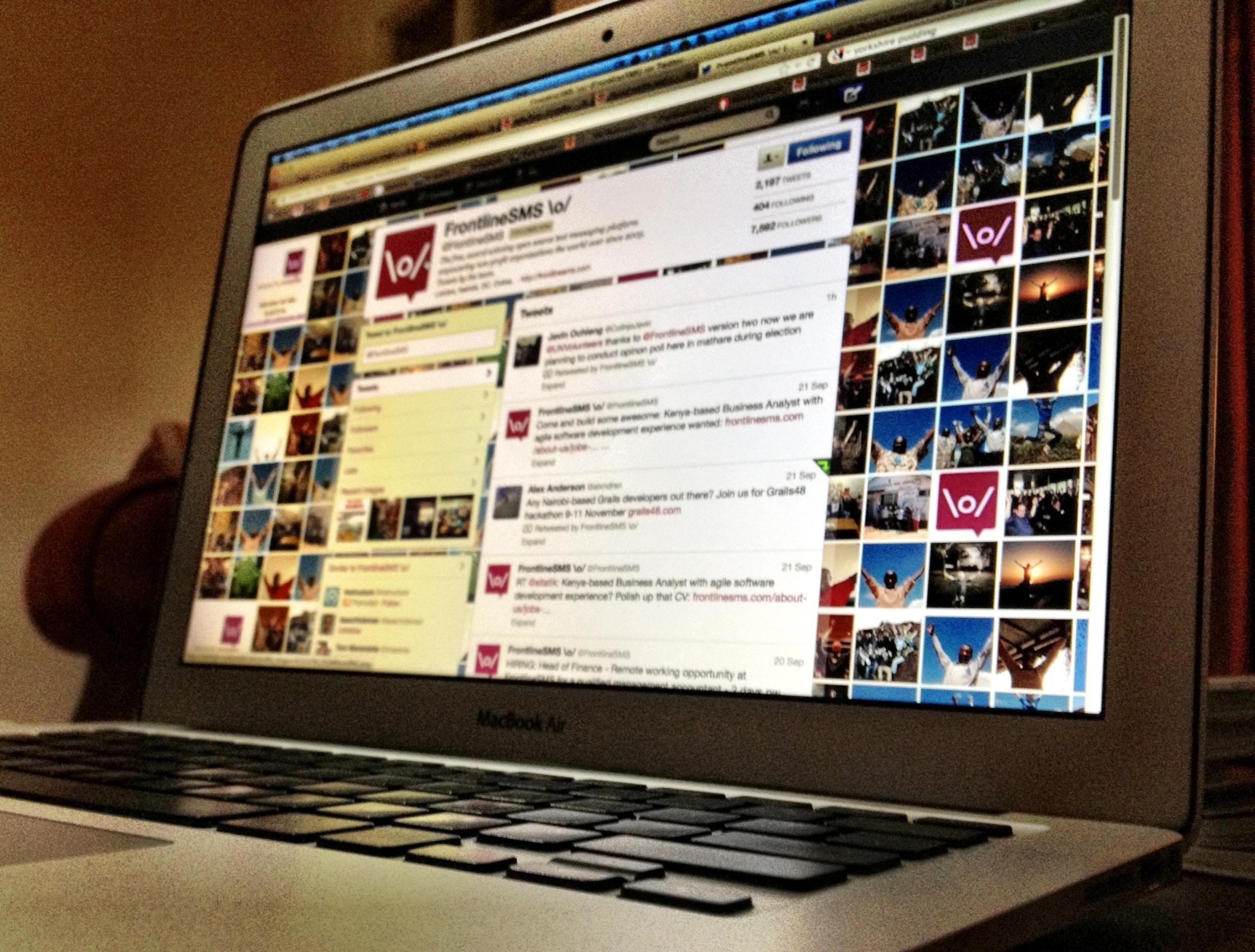
In a recent BBC Future article I wrote about the "democratisation of development". In it, I argued that the dual rise of the world wide web and mobile technology had opened up the opportunity for everyone to contribute to solving some of the world's bigger problems. Today, someone with an Internet connection and a software development kit can write a health-, agriculture- or human rights-focussed application and begin building a global user base within days, if not hours. To quote from my article, there are likely more people working on solving social and environmental problems in the world today than ever before in human history. Clearly this can't be a bad thing.
An Internet connection and a software development kit, along with the odd phone, cable and GSM modem - a luxury item back then - was exactly how FrontlineSMS got going in 2005. Slightly ahead of the curve, it took advantage of the increasing numbers of mobile phones in the hands of communities in the developing world and allowed non-profit organisations working with those people to better communicate with them. The idea and software development were carried out in relative isolation. It took the Internet and gradual rise of social media to truly open up the opportunity. Without either of those the project would not be where it is today. Without it, very many others wouldn't be where they are today, either.
When my IT career began in the 1980's, software was still mailed out on floppy disks, and software updates were few and far between. Clearly, anyone interested in software development had a clear problem of distribution, not to mention promotion. Back then I found out everything I needed to know in trade magazines. If FrontlineSMS had been born back in those days it would never have taken off. Without funds for promotion, and without any way of connecting easily with users, or getting the software to them, it would have gone nowhere. I often wonder how I'd have mailed floppy disks to users in remote Sierra Leone, or Indonesia, even if they had managed to hear about it and want a copy. The Internet changed all that. Today, the FrontlineSMS website is the equivalent of a double page spread in a glossy computing magazine, and the download button the equivalent of dropping floppy disks in the post. Not only are things much much quicker, they're as good as free, and the reach is enormous.
Social media has played a considerable role in the success of FrontlineSMS, too. The project never had a marketing and promotion budget, so in the early days it was all about maximising every free channel that was available. Blogging was the first. People were kept up-to-date with latest user statistics, case studies, conference talks, guest articles, grants and snippets of news. We pride ourselves in giving our users a voice and letting them tell the world how the software has impacted their work, and this strategy worked incredibly well. Comments were left on other blogs writing about technology and development, and often they linked back to FrontlineSMS articles and posts. It probably took a couple of years, but blogging eventually got us the early traction we needed.
To show how long FrontlineSMS has been around, Facebook wasn't really up to a huge amount back in 2005 (although it was clearly going places). As the user base grew, we took advantage of its increasing reach by cross-posting blog entries and setting up group pages. Facebook, as Twitter has done more recently, crucially helped take the project to a new audience. Whereas blogging had largely promoted it among the technology-for-development (ICT4D) community, Facebook allowed for more serendipitous connections to develop. One of those directly lead us to Wieden+Kennedy, a design agency who later worked on the first revamp of the FrontlineSMS website, and the development of the now infamous o/ logo. Since then, Facebook and Twitter have been crucial in helping us promote the use of the software, in sharing news, and creating buzz around new software releases and new grant funding.
At another level, social media has been central in allowing us to recruit volunteers and staff. Twitter now effectively acts as our "Volunteer, intern and vacancy" bulletin board, with increasing numbers of staff coming through connections first made on Twitter. When Laura Walker Hudson joined us a couple of years ago a tweet was not only the catalyst, but the very fact we were following each other signified, in my mind, a solid long-standing interest in who we were and what we were trying to do.
Without the world wide web, and the now ubiquitous social media platforms that sit on top of it, it's hard to see how FrontlineSMS would have made any ground at all. As we hear all too often, ideas are one thing but execution is another. Execution, however, is much harder if - armed with that great idea - you're not able to tell people about it. In Social Media Week we, at FrontlineSMS, acknowledge the role it has played in our own story and, along with our countless thousands of users around the world, say thank you for all the good things it has helped us and our dedicated community make possible.
Designing for the REAL 95%
As occasionally happens, Ken and I find ourselves on opposite sides of the world at conferences this week. Ken is at Mobile Web in Africa 2010, in Johannesburg, and I'm hereby asking him to tell you all about it here when he gets a minute. o/ I'm at Design for Persuasion in Ghent, Belgium, with a room full of people who've never heard of FrontlineSMS - this is only the second time I've done this kind of event, but it's something we're committed to doing because that's how we get the word out to new audiences. As I did after the Digital Indaba in July, I thought I'd post the gist of my talk here. You can also listen to an AudioBoo which I recorded in a far more coherent manner than the actual talk, shortly afterwards.
Sidenote: I showed, as I always do, Ken's favourite diagram of 'social mobile's long tail'. Related but different is the persuasion map we're all developing (read: wrangling over) live at the conference, at BJ Fogg's suggestion. It maps technologies along axes showing prominence versus usefulness. SMS has already moved from unknown to well known, and from useful to not useful, a couple of times. Will be interesting to see where it ends up - or who gives up first...
Since I joined the team back in March I've spent a lot of time emailing our users and begging them for stories and feedback about their experience. You can read a version of this plea here! Many of you have given generously of your time and energy to write and tell me your thoughts on the platform and the challenges of implementing using SMS.
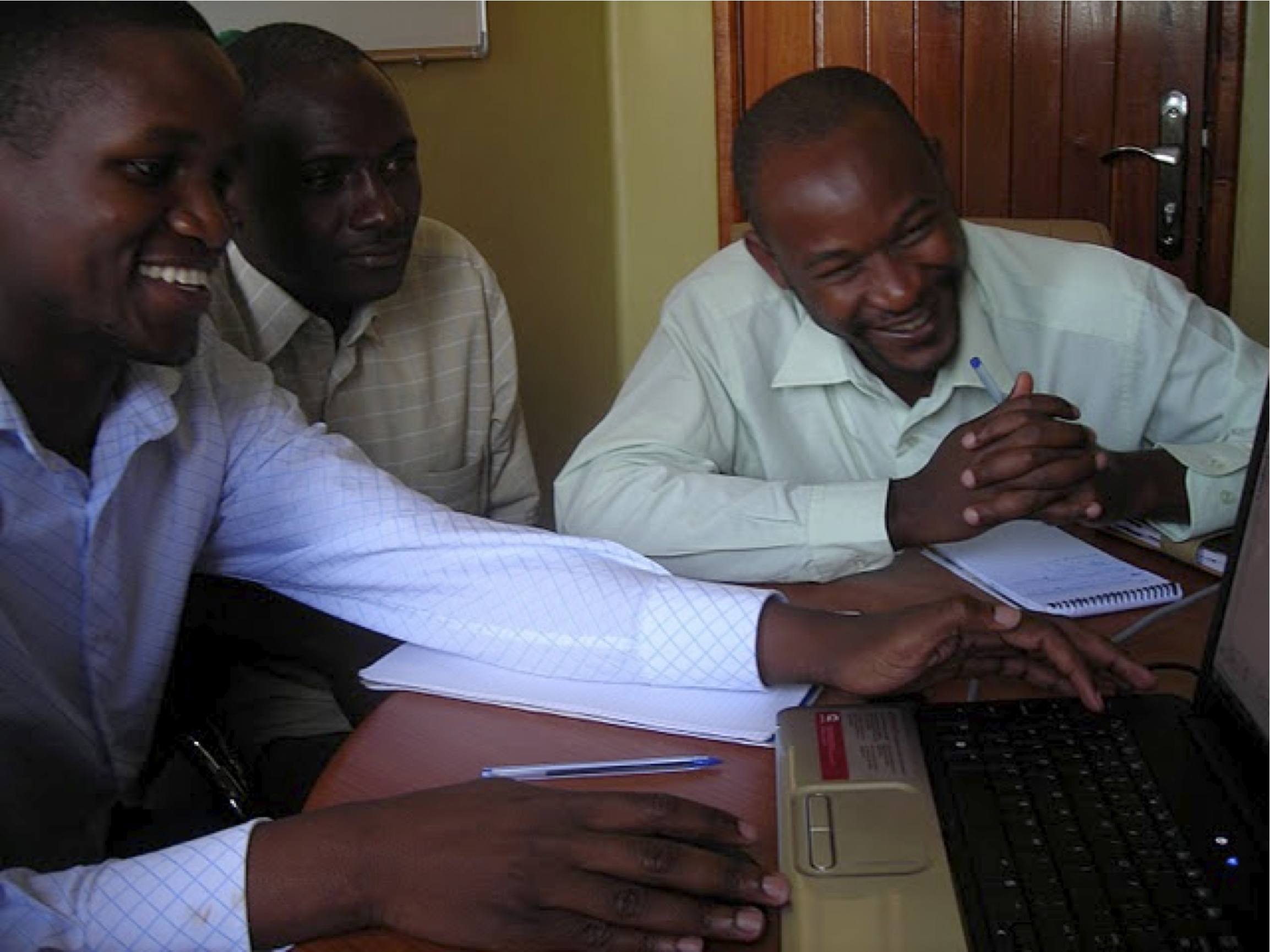 Something that surprised me a bit was the low proportion of users who were utilising more than the most basic functionality in FrontlineSMS. Many, perhaps 90-95%, are using only the functionality up to and including keywords to automatically respond to incoming SMS, or simply organise incoming SMS. But not all are aware of additional plugins like the Reminders module and the enormous potential of Medic's PatientView. Even auto-subscribing people to groups via SMS is a step beyond what many have time to set up.This might be controversial - do people disagree? Am I getting a false picture?
Something that surprised me a bit was the low proportion of users who were utilising more than the most basic functionality in FrontlineSMS. Many, perhaps 90-95%, are using only the functionality up to and including keywords to automatically respond to incoming SMS, or simply organise incoming SMS. But not all are aware of additional plugins like the Reminders module and the enormous potential of Medic's PatientView. Even auto-subscribing people to groups via SMS is a step beyond what many have time to set up.This might be controversial - do people disagree? Am I getting a false picture?
If not, the low take-up of advanced features is probably to do with capacity and time - both for many of the small community-based organisations who are our target user, if we have such a thing, and for larger NGOs and international organisations. Indeed, we know at times people struggle to get basic FrontlineSMS functions working effectively and meshing well with their existing work. We're tremendously excited about the potential of new functionality and technology, and small groups of users will be able to make excellent use of them - but for the majority of users, basic troubleshooting, support and advice are critical.
In the coming weeks we'll be working on our plans for the software in 2011 - stay tuned for more from this from our Lead Developer, Alex. Our role in providing user guides and resources, advice and support, and even training is something we're also looking carefully at. As ever, we'd welcome your thoughts.
Your stories are our bread and butter
Friday morning saw me zooming up Portobello Road in west London, cursing the tourists and looking forward to a large flat white with some new acquaintances - I was meeting with a couple of people have just started to use FrontlineSMS for campaigning. This is an increasingly common, and always delightful, part of my job. I generally pepper people with questions, exclaim 'that's interesting' every ten seconds, and scribble furious notes. Often, people ask for advice - what's the best way to fit this into our programme? How should we pilot? How much will it cost? The thing is, I'm not the expert, hence all my questions - but I know where to find the real pros.

FrontlineSMS are a diverse bunch, based all over the world, as our new Member Map is beginning to show. You're working on projects in all sorts of fields, from safe motherhood, to community cohesion, to citizen journalism, to minority rights activism, and all points between and beyond. And YOU are the FrontlineSMS implementation experts. We know the theory, and of course we know the software, but there's no substitute for experience when it comes to finding ways around the real world pitfalls and problems that users encounter. So if anything, I'm less an expert myself, and more of a matchmaker, linking people using FrontlineSMS in similar ways; or a librarian, remembering stories of past solutions and pointing them out to people encountering a similar problem.
So where do we find these examples? Well, face to face meetings are probably the richest way for us to find out what you're up to. We'll go anywhere! Send us an email and we'll hop on a plane, train or death-defying local form of motorbike transport and come see you. Failing that, we often give examples from our guest posts, or from email correspondence with unfailingly generous people all over the world who have millions of things to do, and yet still find the time to sit down and tell us what they're up to.
We're also working with a couple of our users to write up glossy, jointly-branded case studies, which get into a bit more technical detail than a guest post can, try to show the impact FrontlineSMS has had, and even list local suppliers. The idea is that FrontlineSMS users should be able to use these documents themselves to explain the SMS portion of their project to their own donors and stakeholders. They'll also be an invaluable resource for others looking to implement a similar programme. Watch this space for the first case study in the next few weeks.
At a more basic level, we need more data about who's using FrontlineSMS - we need to know who you are, where you are, and what you're doing. People like numbers - what, where, how many. For this reason, we added a small tool to a recent version of FrontlineSMS that offers to send back anonymised statistics to us (more on that in a future blogpost, as they've only just started to come in).We'll also be running a user survey in September to try and get a better picture of how FrontlineSMS is being used. Finally, in 2011 we'll be working on allowing you to register your copy of FrontlineSMS.
All this information gathering has three purposes:
- We find that it's only when we get to know you that we start to hear what we should be improving, what not's working, what else we should add. All the new features we've added (Translation Manager, Forms, and the HTTP trigger) have been in response to your feedback. And it's only when you tell us that we know something's not working - users reported a problem with the software on Monday morning, and we had it fixed and a new version uploaded within a few hours.
- As I said above, you're the experts. Hearing from you means we can share more with other users, and help give people ideas for how to use FrontlineSMS in their own work.
- We can explain to our donors and supporters what FrontlineSMS is achieving in the world, which enables them to keep supporting us, and in turn, lets us keep doing all the things we do to keep FrontlineSMS evolving and keep the community flourishing.
Your stories keep us improving; keep us innovating; and keep the lights on in the office. Better still, they help inspire other users. Do you have a story to tell?
Using SMS in disaster response - and preparedness
 A couple of weeks ago I had the great pleasure, and honour, of joining a wonderful panel, including Carel Pedre, Haiti DJ and activist, and Rory Williams of Carbonsmart.com, at the 5th Digital Citizen Indaba in Grahamstown, South Africa. The brief was to talk about digital communication in the context of natural disasters and climate change. I've spent the last three years working on humanitarian policy, so it was a real treat to bring past and current preoccupations together and let them go for a little walk, arm in arm. As ever though, time ran short, so I thought I'd repost the gist of the presentation here.
A couple of weeks ago I had the great pleasure, and honour, of joining a wonderful panel, including Carel Pedre, Haiti DJ and activist, and Rory Williams of Carbonsmart.com, at the 5th Digital Citizen Indaba in Grahamstown, South Africa. The brief was to talk about digital communication in the context of natural disasters and climate change. I've spent the last three years working on humanitarian policy, so it was a real treat to bring past and current preoccupations together and let them go for a little walk, arm in arm. As ever though, time ran short, so I thought I'd repost the gist of the presentation here.
Thinking through what to say, I went back to the basics of understanding what happens in a disaster, and what local, national and international organisations, communities and individuals can do to mitigate their effects and help people recover when they happen. I came across this excellent visualisation of the phases of disaster management and response by the University of Wisconsin's Disaster Management Center, via Özge Yalçiner's thesis.
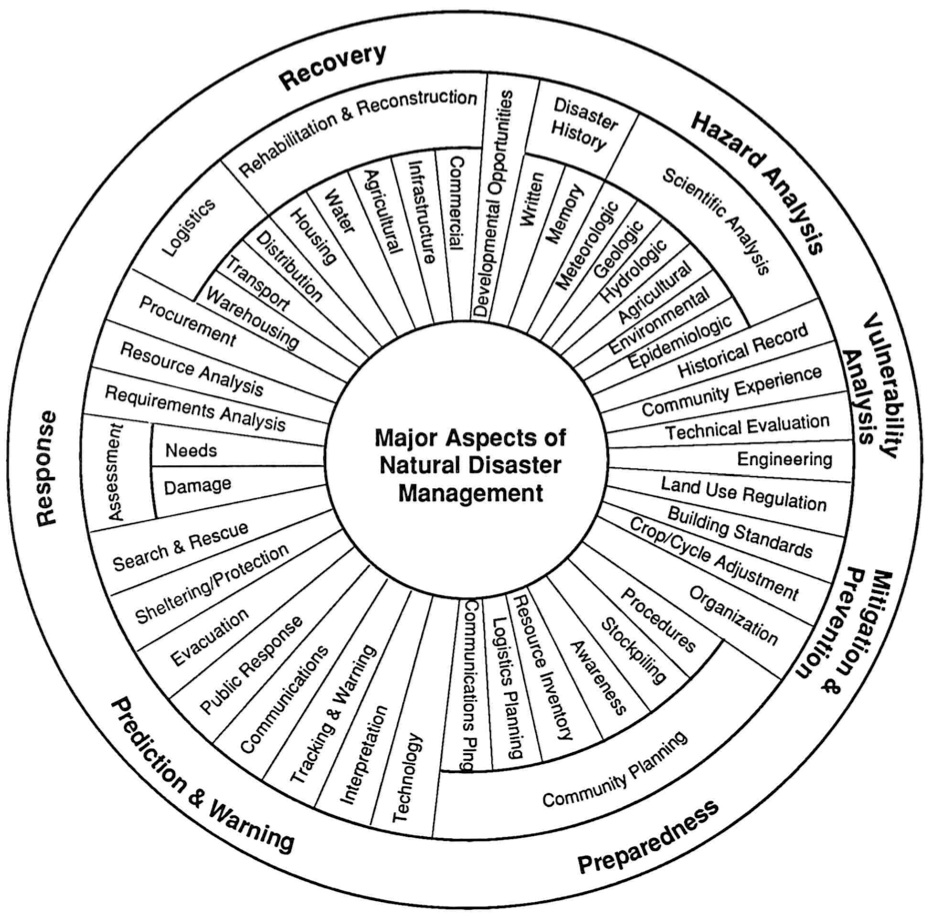
What's striking about this graphic is how little of it is taken up by what we might think of as classic disaster management - maybe a third of it - if you imagine it as a clock face, from about 8 'o' clock to midnight. Even then, the bit that generates most of the donations and media coverage lasts even less - by the time we get up to ten or eleven 'o' clock, when the slow, laborious process of recovery begins, the world's attention has usually moved on, barring major anniversaries and scandals. I think we're seeing this with Haiti right now. But fully half of the wheel is taken up with understanding and preparing for disasters before they happen. Another big slice represents the critical prediction and early warning analysis in which governments and local knowledge play an essential part.
Much of this work, all the way around the wheel, requires community participation - and quite right too. Requirements analysis and needs assessment need local knowledge and community input; reconstruction must be community-led and owned to be successful. Then follow the wheel round to between midnight and 1 'o' clock - there's a segment devoted to gathering disaster histories and experiences, both to learn and to help plan and prepare for future emergencies. Again, this is a key point of community action. Between 2 and 3 'o' clock, vulnerability analyses bring in community maps, workshops, focus group discussions, and other techniques to make sure that interventions and community support mechanisms reach the right people and places at the right moments. And last-mile disaster preparedness and early warning systems and mechanisms just won't work unless they are truly owned by the communities who have to enact them.
This will come as a surprise to none of you, given the focus of this blog, but: I think there's a significant opportunity here to use SMS to help communities to engage with these processes and get their views heard. Complaints and response systems, data-gathering, early warning and evacuation alerts all have and should be delivered using SMS, given its ubiquity in areas that are otherwise hard to reach. Two-way communication using an SMS hub running FrontlineSMS would enable you to send alerts, information about distributions, advice and even messages of support and solidarity; and more importantly, receive information about what's happening on the ground, invaluable local knowledge, and feedback on the success of programmes, and allow people to express what they are feeling. The Haiti experience has shown that this is possible in an emergency setting, and the important work of evaluating the success of those programmes is ongoing - the next step being to build on this learning to improve our understanding of best practice for SMS in emergencies. And as I write, agencies now experienced in using SMS in the fraught days after a disaster are thinking about how to maintain those links, and forge new ones, as they move into the 'recovery phase'. But many organisations are beginning to use SMS in the longer-term, more gradual process of helping people to mitigate and prepare for the risks they're exposed to - we know many are using FrontlineSMS.
We didn't get time to talk much about this on the day, but maybe we can carry on the conversation now. What do you think?
I really enjoyed the event and the thought-provoking discussions about digital activism. I'm very grateful to the DCI team for asking us to be part of the day, and to the lovely participants, who very obligingly joined in with a bit of what I like to call FrontlineSMS Pilates.












